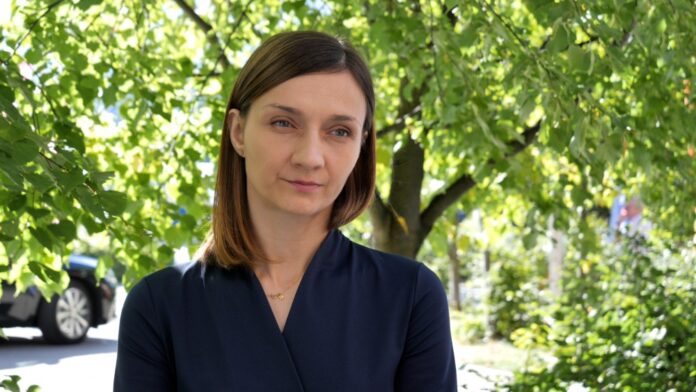The majority of Russian society supports or silently accepts the rule of Vladimir Putin and the war conducted in Ukraine. Furthermore, following the invasion of the country, support for the actions of the Kremlin significantly increased in public opinion polls – as shown by last year’s analysis by the Centre for Eastern Studies. However, this surge in approval is a result of large-scale disinformation and an elaborate propaganda machine, which has been presenting Russian society with a distorted image of reality since the beginning of the war. The Kremlin regime spares no expense for this purpose, as well as for propaganda aimed at the international community, including Poles. However, simple manipulation doesn’t work here so the Kremlin exploits societal weaknesses and emerging tensions between Ukrainians and Poles.
Russian aggression against Ukraine is not only military but also propagandistic. To this end, the Kremlin maintains an extensive propaganda apparatus aimed at disseminating disinformation, justifying the war, and gaining and maintaining the support of millions of Russians.
“The Russian disinformation machine is very extensive. It involves state leadership, the presidential administration, special services, state media, as well as social media and various institutions pretending to be non-governmental organisations, which in fact duplicate the Kremlin’s narrative. There are also various social actors who amplify this narrative and ensure that it reaches wide social circles,” says Katarzyna Chawryło, analyst and main specialist in the Russian team at the Centre for Eastern Studies.
As the analysis published by the Centre for Eastern Studies shows, the main channel for this war propaganda within Russia is state television, which reaches a significant portion the population – over 60% of Russians, mainly older people and those outside large cities – and has a decisive influence on their beliefs. The most popular television channels, Rossija 1 and Rossija 24, belong to the WGTRK holding, which is the main radio and television broadcaster in the country, as well as the government’s Pierwyj Kanał and the NTV channel, which belongs to the state-owned Gazprom Media company. After the war started, censorship was imposed on scarce independent sources that had previously existed in Russia, and they were eliminated. State media obtained a monopoly on reporting events in Ukraine, and they significantly extended the duration of news and public affairs programmes. Kremlin propaganda on state TV channels took on a total character, with their messages entirely devoted to the “special military operation”, as Putin banned the use of the term “war”, and coordinated with state administration statements.
“Russian society is very susceptible to manipulation due to the low level of education and poor access to objective information because Russia now has complete censorship, there are no free media there. If someone wants to look for independent information on the internet, they need to show quite a lot of determination to get to the truth. On the other hand, generally available state media reproduce false narratives when it comes to the conflict in Ukraine, international relations, whitewash Russia’s aggressive actions, promote a false vision of history, and present Russia as a state being attacked, not attacking. They show a state with a historical mission to fulfill, exacerbating a sense of grievance, insult and a sense of superiority over other nations. That’s why Russian society believes the Kremlin and supports this aggressive policy,” Katarzyna Chawryło explains.
As reported by the Centre for Eastern Studies, public support in Russia for Putin’s actions expressed in public opinion polls significantly increased after the invasion of Ukraine. In March last year, it reached over 80%, while in January, i.e. before the invasion, it was 69%. However, analysts stress that caution should be applied to poll results because – due to censorship and increasing repression against society – the results may not fully reflect citizens’ views. It can certainly be said, however, that the majority of society supports or silently accepts Putin’s rule and the war.
“Public opinion polls, which may not be an objective tool, pretty accurately reflect the mood in society when it comes to the war, show that unfortunately Russians support this aggressive policy to a large extent. This is due to the belief that since we have already been attacked, since we have already been forced into this war, we have to win it. The Kremlin relies on this, using various kinds of disinformation and propaganda tools to shape public opinion in a direction favourable to itself,” says the main specialist in the Russian team at the Centre for Eastern Studies.
Russian state media and the propaganda apparatus present society with a completely distorted image of reality. Already several weeks before the invasion, the media stepped up their message about relations with Ukraine and switched to a more aggressive and offensive language towards Ukraine and the West, preparing Russian society for the planned assault. Later, propaganda convinced people that Russia’s aim was to protect the Russian-speaking population in Donbas, which had been persecuted in recent years as a result of a “genocide” conducted by the “regime in Kyiv”. The official objectives of the special military operation include the demilitarisation and denazification of Ukraine.
One of the disseminated messages is the one according to which the real enemy of Russia, responsible for the escalation of the situation in Ukraine, is the West – understood as NATO with the USA at the head. In the narrative of propaganda, Russia is trying to break away from Western influences, it is presented as the defender of values, opposing the “rotten” West.
“Alongside Russian society, another target of the Kremlin’s disinformation activities is also the international community, where Russians are trying to promote their goals in international politics, justify their policy, apply pressure and make decisions on the international stage that are beneficial to them,” says Katarzyna Chawryło. “Here, the Kremlin’s activities are much more sophisticated and therefore harder to counter and more dangerous. There is some adaptation of propaganda content to what might be successful, what might be effective in a given country. That’s why in Poland, for example, Russians do not push such narratives directly glorifying the actions of the Kremlin or Vladimir Putin. They know that such narratives will not be popular in Polish society, they won’t break through.”
The tactic adopted by the Russians involves exploiting the weaknesses of Polish society and playing on divisions, undermining public trust and antagonising society against Ukrainians.
“For example, they drag our country into a war that has nothing to do with us, is not in our interest. They emphasise that the state militarily supports Ukraine and is disarming its own army. These narratives, which also play on high emotions, increase the sense of fear, disorientation, lack of trust, they are such narratives that destroy social fabric, causing chaos, shaking up society,” says the OSW expert. “Then there are also a number of narratives related to history. A very effective narrative referring to historical relations between Poland and Ukraine, including the topic of the Wołyń Massacre. Here, Russian disinformation feeds on ignorance and stereotypes, tries to build parallels between past and present situations based on stereotypical opinions, build hostility in Polish society towards Ukrainians, the Ukrainian government and exacerbate any tensions that arise in relations.”
The aim of Russian disinformation is to discourage international opinion from supporting Ukraine. A lone Ukraine would be more inclined to make concessions in potential negotiations on ending the war.
“Bearing these motivations in mind, I think it will be easier for us to assess the Russian narrative and oppose it, because it is used instrumentally. It’s not about getting to some historical truth or compromise, it’s about simply destroying what Poland and Ukraine have managed to build,” says Katarzyna Chawryło.


















